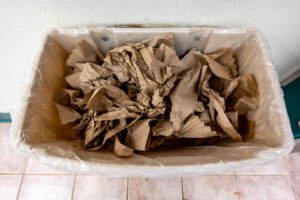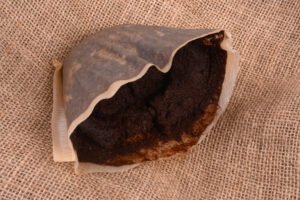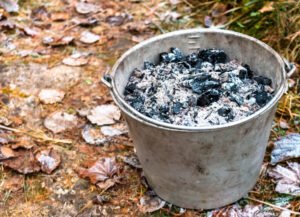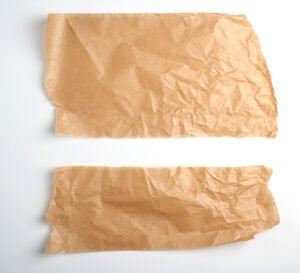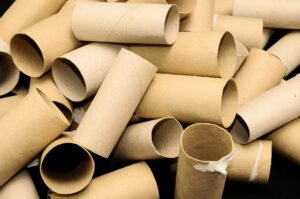We enjoy wine at our booze parties, but the corks are useless once the bottle is empty. But if you have a green thumb, you could always mulch the corks. But did you ever consider composting them? If not, you must! So, can you compost wine corks? If yes, how so?
Key Takeaways
- You can and should compost wine corks as they help hold water in the compost pile, give you carbon-rich humus, and help structure it.
- Since wine corks are impermeable and hard, it’s recommended to compost them via the Hot Composting method, which you learn below with steps.
- Make sure to use only natural, degradable corks for composting, as synthetic corks might contaminate the compost. There are other crucial things given below that you must consider while composting corks.
So, read along to learn the right way of composting wine corks, its benefits, and some tips!
How to Compost Wine Corks
Wine corks are natural materials stripped off from the cork oak. They are rich in carbon and add structure to your compost. But corks break down slowly due to their impermeable nature and thus must be composted carefully.
To compost the wine corks effectively, you need to add them in small pieces and mix them with green materials to generate heat.
Hot composting is the best method for composting wine corks because it is aerobic and has rapid microbial action in the compost heap that will aid the decomposition.

So, here are the brief steps you need to follow to compost wine corks effectively through the hot composting method:
Step 1. Set Up Your Compost Bin
Buy a compost bin, or make one with an old plastic container or dustbin by drilling holes around it. Place the bin in a sunny corner and make sure not to use a lid.
You can also pile up your compost in a pit or leave it in your garden, where you get abundant sunshine.
Step 2. Collect Natural Wine Cork for Composting
Collect real and natural cork from used wine bottles. You can also consider using cork from bulletin boards, glass jars, or any other cork products devoid of glue, paint, or any non-biodegradable materials.
Do not add any synthetic or plastic wine cork. These are commonly used for capping wine bottles nowadays but should not go in your compost bin.
Step 3. Cut the Wine Corks
Remove the screw lid, plastic, foil, and other coverings, and sterilize the corks in boiling water. Now cut them into small pieces using a sharp knife. The smaller the cork chinks, the better.
Step 4. Add Brown Materials to the Bin
Spread the shredded cork evenly on the bottom of the compost bin. You can also mix it with other brown materials like dry leaves, paper towel shreddings, dry bark, and other yard waste.
Step 5. Add Green Composting Materials
Add a firm layer of food waste like fruits and vegetable peels, coffee grounds, eggshells, and tea bags over the brown materials.
Avoid using meat, fish, and oily food scraps in the compost pile, as they will spread a foul smell and breed unhealthy microbes in your compost bin.
Step 6. Repeat the Layers
Repeat adding wine corks and food scraps alternatively while watering each layer. Finally, complete the bedding process by sealing the top layer with soil.
Step 7. Maintain the Compost
The compost bin should be hot (130-140 degrees) in order to carry out the cooking process of wine corks. Mix the composting materials and turn them in twice a week to oxygenate the compost pile.
You also need to check the moisture and water the bin regularly to keep the microbes healthy and active.
Rich brown soil or compost with an earthy smell will be ready in a few months, and you can add it to enrich your garden soil.
It is required to balance brown and green materials as the Carbon-rich browns provide food to microbes, and Nitrogen-rich green materials help in the growth of microbes to accelerate the decomposition process of wine corks.
How Do You Cut Wine Corks?
It is essential to cut the corks into small pieces to use wine corks for composting as well as mulching. But did you know it is not as simple as it appears to cut this spongy material?
So here are a few tips for cutting the wine corks easily:

- Cut Them With Knife: This is the common method used to cut wine corks when they are in limited quantities. But make sure to use a serrated knife to make the cutting process easier.
- Boil the Wine Corks: Boiling the corks will soften them like other organic materials. Boil the wine corks for 10 minutes. Then strain the water and let them cool down. Once done, you can cut them into smaller pieces using a regular knife.
- Blend Your Cork: Another method to break down the cork is to blend them into powder. This will make the composting process real quick. But when you consider mulching them, you need to be careful not to let the cork turn into fine powder.
Benefits of Composting Wine Corks
Wine corks, like many other natural products, are compostable but are underrated due to the time they take to decompose. However, that doesn’t matter if you do it effectively.
Well, if you have a second thought about composting these beautiful brown materials, here are a few benefits you need to know.
- Wine corks add organic material to the soil and help in plant growth.
- Real cork does not produce any toxic residues and is a great addition to your compost pile.
- Corks help hold moisture in the compost heap and structure the final compost.
- Wine corks are biodegradable and 100% environmentally friendly.
- They are a cheap source of fertilizer and can be used naturally without any synthetic chemicals.
Additional Tips for Composting Wine Corks
Wine corks are great for composting, but did you know they take years to decompose if not done correctly? So, here are a few crucial tips to compost corks effectively:
- Prior to composting wine corks, check if it is real cork. You can check this by cutting the cork. If it is foamy and even on the inner side, it is a synthetic cork. Natural cork does not look uniform.
- Remove all artificial materials attached to the corks, like plastic, screw lids, and foil covers.
- Chop the wine corks into small pieces to compost them quickly.
- Add ample green materials to the compost pile to help the cork break down faster.
- Turn the compost pile regularly to promote aeration.
You can also differentiate between real/natural and synthetic cork by lighting a match stick near it. If it melts, it is a plastic cork.
Can You Recycle Wine Corks?

Wine corks are recyclable as they are durable and plant-based materials. Recycled wine corks can be turned into useful items like yoga blocks, bags, flooring, or shoes.
However, they can’t be recycled with normal doorstep recycling methods, but some companies like Recycle Now, TerraCycle, and ReCork accept wine corks and turn them into useful products.
Cork Forest Conservation Alliance and ReCork, the largest cork recycling companies, have many collection centers in North America to recycle wine corks.
Mulching With Wine Corks
Mulching is a great way to repurpose wine corks for your plants if you lack a composting setup. Natural corks are excellent in conserving moisture, keeping the soil cool, and adding color to your garden. And they are resistant to mold or fungus.
Because wine cork breaks down slowly, it eliminates the need to change the mulch frequently, and once decomposed, they add organic matter to the soil. Cork mulch also protects the roots and inhibits weed growth.
To mulch the wine corks, you need to cut them into pieces or grind them into a coarse structure. Then spread the ground mulch around your plants. But make sure to use only natural cork for mulching.
They also serve as an alternative to styrofoam and help with drainage. But since you might be short of wine corks to mulch your whole yard, you can use them for your potted plants.
Other Common Uses of Wine Corks In Garden
If you want to use wine corks for your garden but do not have a compost pile, worry not. There are several other methods to use cork in your garden. Here are a few you need to think about.

- Make a plant marker using the corks. This will help you identify different plants and where you have planted them.
- You can build a beautiful fairy garden from your wine corks.
- Use wine corks to make planters for small plants.
- You can decorate your garden with a beautiful birdhouse made of wine corks.
- DIY succulent wall magnets using wine corks.
- Make a hanging cork planter.
How long do wine corks take to decompose?
It takes a few years to compost wine corks as they are impermeable and have a hard outer layer that is resistant to mold, fungus, and water damage. Henceforth, the breakdown process will be slow. To speed up the process, you should add small pieces of cork to your compost pile along with plenty of green material.
Are wine corks good for your garden?
Wine corks are great for your garden as they conserve moisture and are antimicrobial, preventing mold. In addition, they act as mulch and nourish your soil while providing nutrients. You can also compost them to get organic-rich humus.
Why is Cork so special?
The interesting feature about cork is that cork wood can be harvested without cutting cork trees. It is made by stripping the outer bark of cork oak, and this bark regrows. The bark can be stripped off once in a decade from the adult trees, and a single cork tree can be used to harvest its bark 16 times in its lifetime.
Can You Reuse Wine Corks?
Corks are reusable. To reuse the wine cork as a lid for other bottles, sterilize it by steaming or boiling it. Once they cool down, they can be used to cap wine bottles, oil dispensers, etc. Corks can also be reused to make crafts or in the garden as planters, mulch, or composting material.
You can follow the zero waste method by recycling or reusing the natural wine cork. They also have several uses in your gardens, like mulching and planting.
But the better way, of course, is to compost corks. This is eco-friendly and serves a purpose for your organic waste. So next time when you sip the wine, don’t forget to collect the cork and toss them in your compost bin.
Like wine cork, another natural, organic material that is underestimated is pine needles. So, if you want to learn more about composting pine needles, we’re here to help!


